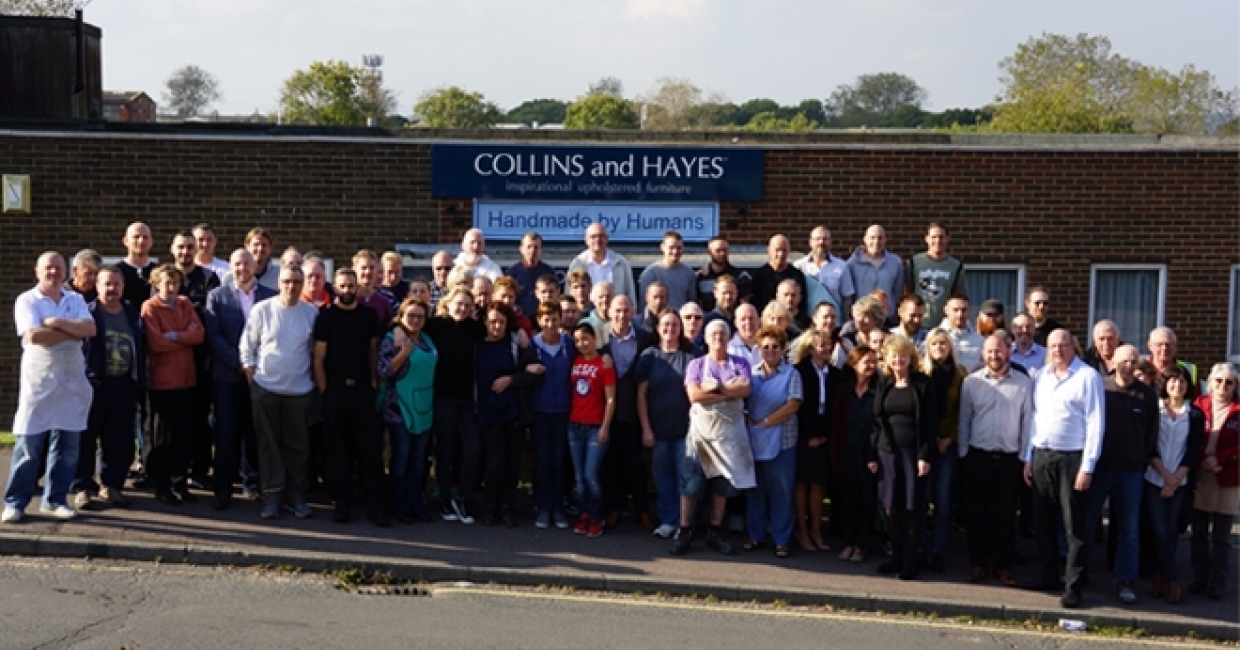Collins and Hayes hit the national headlines earlier this month when MD Matt O’Flynn hit back against comments made by the Home Secretary, Amber Rudd. Furniture News paid the factory a visit to discover how a conflict over immigration masks a deeper wound in the UK manufacturing sector …
The banner above the entrance to Collins and Hayes’ Hastings showroom reads ‘Handmade by humans’. No, it’s not a herald of a robot uprising – whilst automation is fast making many areas of manual labour redundant, we’re not in the realms of science fiction just yet – but a rebuttal to comments made by the Home Secretary, Amber Rudd, on BBC Radio 4’s Today show on 5th October.
Discussing proposals to force businesses to reveal the complement of foreign workers they employ as the prospect of Brexit looms, Amber stated: “I went and visited a factory quite recently, where they recruit almost exclusively from Romania and Poland, where they have people who have experience in factories building these sofas that they have.
“They didn’t even consider training locally – there was a local college they could have worked with, but they choose to recruit outside the UK.”
It didn’t take a genius to identify the manufacturer in question – in her role as the Conservative MP for Hastings and Rye, Amber had visited upholstery manufacturer Collins and Hayes in July 2015, its factory a literal stone’s-throw away from Amber’s constituency office.
Furniture News magazine was present when the MP (then the climate secretary) took up an invitation from MD Matt O’Flynn to tour her neighbour’s operation – an offer which was, ironically, intended to drum up local recruits.
On the face of it, Amber’s comments seemed strangely out of sync with her experience. Was this a simple mistake, or a politician putting her office ahead of her constituents’ feelings?
Upon hearing of the criticism, a bemused Matt O’Flynn was contacted by various media, whereupon he took the opportunity to “set the record straight”.
“She couldn’t have picked a worse example to drive her point home,” says the MD, who asserts that rather than “exclusively” foreign labour, around 75% of Collins and Hayes’ 98-strong workforce are local, and that the much smaller contingent of EU-sourced labourers comprises skilled workers that are simply not available in the area.
“It’s not that we don’t recruit locally,” continues Matt. “We have long used a local recruitment specialist to source our staff – and have even twice taken part in Amber Rudd’s own job fairs – but you just can’t find skilled sewing machinists without going further afield. And I’m not sure if there have been implications that we’re doing this to line our pockets, but, crucially, when we do employ foreign workers for their skills, they are paid the same as the rest of the factory floor staff.”
Many of Collins and Hayes’ competitors have already taken to manufacturing abroad, but Matt is proud that his sofas are 100% made in Britain. Indeed, the company received two industry awards this year in recognition of its products’ quality and provenance.
The scale of the minister’s error is compounded by just how integral Matt is to the UK furniture manufacturing scene. As the chairman of the British Furniture Manufacturers’ association (BFM) and the Long Eaton Guild of Furniture Manufacturers, he is well aware of the challenges facing the sector, and has long championed the path to industry.
“The BFM was linked to the Government’s Proskills training council before its funding was withdrawn by the Government,” he points out. “Today, Webs Training fulfils an important part of this role, but it’s funded by the industry, not Government.”
That said, the problem runs deeper than a lack of available training. Low rates of pay and an inherently unglamorous reputation makes a career in furniture manufacturing an unlikely prospect for the majority of school leavers. “It’s the underlying attitude to work that’s the issue,” says Matt, who predicts greater numbers turning to manual professions as the cost of tuition fees becomes increasingly prohibitive.
Matt also explains how many career paths are open to those starting out in manufacturing, which may not be apparent at first glance – some of his management team started out on the factory floor, and he describes one employee’s journey from the frame shop, to prototyping, to design and development, and then on to shopfitting and factory management roles in London.
Underpinning Matt’s frustration is the wider context of globalisation, recession and Brexit. “She’s chosen to pick on a very fragile industry,” he says. “We’ve lost an astonishingly high amount of business overseas. Yet in 2011 it began to recover, and started to see a repatriation of sorts – as fuel prices went up and the pound got stronger, the price of British-made goods became more competitive.The imports bubble had burst – there was a desire to sell better quality.
“We’ve got an industry that’s just starting to reconnect with the consumer – we should be celebrating rather than criticising it.”
Matt’s belief saw him take to the airwaves that week to defend his company and employees, and to draw attention to the challenges British manufacturers face. Although the mainstream media seized upon the story’s political ramifications, Matt is more concerned with shedding light on this “often-misrepresented” corner of industry.
He fears that any immigration restrictions enforced post-Brexit will only widen the skills gap – given the lack of measures in place to encourage and train skilled workers.
“I take issue with the dehumanisation of my workforce, and the false nature of Amber’s comments, but I would welcome another visit from the Home Secretary, to discuss and continue exploring how we might help solve the problems I've outlined,” says Matt, before smiling, and adding: “We’re still looking for local staff – any available sewing machinists should get in touch!”







